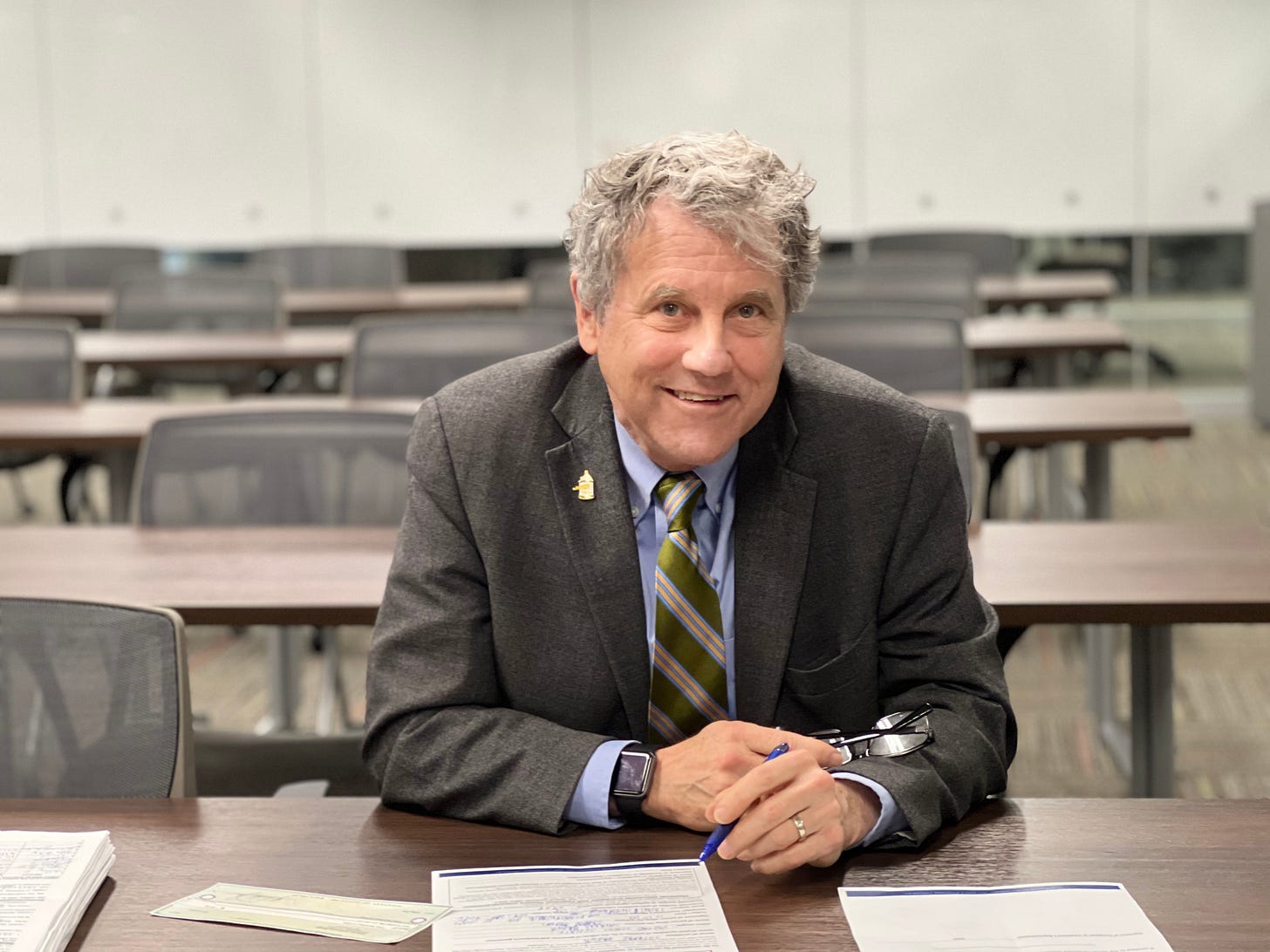Here We Go Again
On Election Night in 2006, after several networks had declared Sherrod to be Ohio’s next U.S. senator, we gathered family and friends and walked from our hotel to Cleveland’s Public Auditorium. I remember thinking we were like a giant caterpillar, clinging to one another as we weaved down a long hallway and through a cheering crowd.
It had been a long, hard campaign to unseat a two-term Republican, and in the beginning few people thought Sherrod could win. By the time votes were counted around the country, Democrats had won both the House and the Senate.
Our victory party was quite a production. Dennis Eckart, a former congressman and senior advisor to the campaign, was in charge of everything from the roster of speakers before Sherrod’s arrival to the final song as we left the stage. To this day, I can’t hear Jackson Browne’s song, I Am a Patriot, without thinking of that moment when we stood on stage and looked up at the red, white, and blue confetti raining from the sky.
Dennis is a longtime friend, and he knew I’d feel awkward trying to figure out where to stand as Sherrod gave his speech. He assured me that he had placed strips of masking tape on the stage, so we’d all know where to go.
“How will I know which one is mine?” I asked.
“You’ll know,” he said, grinning.
He was right. That’s my stage marker in the first photo, surrounded by fallen confetti and framed as a gift by my sister-in-law Anne Swanson.
Dennis knew I hated being introduced as “the lovely wife.” What woman, let alone a writer, wants to be a cliché? He also knew that …and His Lovely Wife was going to be the title for my memoir about the campaign, which would come out the following year.
I still remember the day I suggested that title to Kate Medina, my editor at Random House. It was right after the forty-eighth time—yes, I was counting—that someone had introduced me from the stage as Sherrod’s “lovely wife.” Only this time, the speaker called me “Candy.” I waved from the sidelines and smiled as people clapped. I was too tired to care. As soon as I was back in the car, I called Kate and said, “I think we have a title for my book.” She immediately agreed.
Yesterday, Sherrod walked into the Ohio Secretary of State’s office and filed his petitions to run for reelection to the U.S senate. This surprises no one who follows politics and is of little interest to those who don’t. Election Day is 10 months and 20 days away. Republican voters still have several months to decide who their candidate will be.
This is my first essay on Substack about Sherrod’s campaign. It won’t be my last, and I say that with relief. I’m not here to convince anyone to vote for Sherrod. I’m just grateful that I don’t have to pretend this isn’t a part of my life for the next year.
Sherrod and I started dating in 2003. He was a congressman, and I was a columnist. So much was written about us in that year-- most of it wild speculation--that we started to feel like pandas at the zoo. After we married in 2004, life settled down. Sherrod kept legislating and I kept writing.
Then, in 2006, Sherrod ran for the Senate.
It was an earthquake for me.
I soon took a leave of absence from writing my column. I wanted to avoid even the appearance of a conflict of interest and make it easier for my colleagues who had to cover Sherrod’s race. After he won, I returned to the paper, which ran a story about how my dual roles as columnist and senator’s wife “could be complicated,” but editors trusted me to avoid conflicts.
Some national reporters, almost all of them male, wondered aloud if I was still capable of doing the job now that I was the wife of a senator. This was infuriating, briefly, until I started explaining that life does not suck the brain out of a woman and render her incapable of an independent thought. Soon enough, they found a new hobby.

I have two enduring memories of my first day back in the newsroom in January 2007.
About an hour after my arrival, a senior editor acted surprised to see me and said, loudly, “Don’t you have a fancy dinner party you’re supposed to be at right now?” It was 10:30 in the morning.
A much nicer memory involves a phone call from Maria Shriver, who had put her journalism career on hold after her husband became governor of California.
We had met once, briefly. Maria had no reason to know me, but she had read The Plain Dealer story about my return to the newsroom and wanted to express her support.
“Please don’t leave the profession,” she said. “Don’t let anyone tell you that you can’t do this job.”
As I wrote in an op-ed for the New York Times in 2011, we talked for about a half-hour, and I got a sense of all that Maria had sacrificed professionally for her marriage. She never complained about that, but she talked at length about her days as a reporter, and why she missed them.
More than a decade later, I have a better sense of the impact Maria’s call had on me. Unlike everyone else giving me advice, Maria knew what it was like to be me, in that moment in my life. She was on my side, without reservation. It’s impossible to overstate how empowering that was. Fifteen years later, here I am, still writing columns. And there’s Maria, back to reporting and writing with her Sunday Paper. I am so happy for her.
Now, I’m once again the wife of a Senate candidate. This time will be different for me.
Months into Sherrod’s second campaign, I resigned from The Plain Dealer because I was weary of the constant tension with some editors. When one of them insisted I be identified as Sherrod’s wife at the end of every column, I knew it was time to go.
Through Sherrod’s next two races, I wrote a column for Creators Syndicate, where editor David Yontz never doubted my ethics. In the last two years, I have written for USA Today because Opinion Editor Kristen DelGuzzi trusted me, too. They kept my voice out in the world. Just writing that sentence fills me with such gratitude.
Now I’m here on Substack, by choice. This time around, I don’t want to avoid topics and write as if I’m not married to a Senate candidate. Some journalists would argue that hiding this part of my life, or silencing me for the duration, keeps boundaries in place. As if pretending we have no biases makes it so. Are we trying to protect the readers, or fool them? I would rather be open and leave it to you to decide if you can trust me. I recall a colleague once complaining to an editor that my writing about Sherrod “humanized” him, as if I had married an orangutan, perhaps, or a tropical fruit. Each of us sees the world through the lens of our own experiences. My lens is just more obvious.
My marriage has little to do with my written opinions, except that it makes me happy, which helps me stay hopeful. Most of the time, I’ll be weighing in on whatever moves me, but sometimes I’ll share behind-the-scenes moments on the campaign trail. This feels more real, and more honest.
I’m often asked what it’s like to be married to a senator. My answer is always the same: I only know what it’s like to be married to Sherrod. In finding each other, we got a second chance at love. After 21 years together, it’s hard to remember a time when we weren’t each other’s touchstone. That’s the wonderful thing about love. Over time, love robs the bad memories of their power.
So, off we go, into the next big adventure. It will be long and hard, and we can’t possibly predict all the ugliness headed our way. But we’ll have each other, and so many good people around us. And we have our dogs, Franklin and Walter.
As I’ve written before, we’ll work hard to stay true to our marital mantra: No whining on the yacht. Look what we get to do.
There’s that hope again.





My husband walked in the room the other night when Sherrod was on The Last Word and asked who he was. "That's Connie Schultz's husband," I said proudly. "I love her writing."😊 I then mentioned that he's one of the good guys in the Senate. 🙃
You and Sherrod exemplify the power couple in and on your own terms, and that’s what’s powerful and glorious. Thank you for taking us along in the ride!
And please thank your lovely husband for working to preserve our democracy.